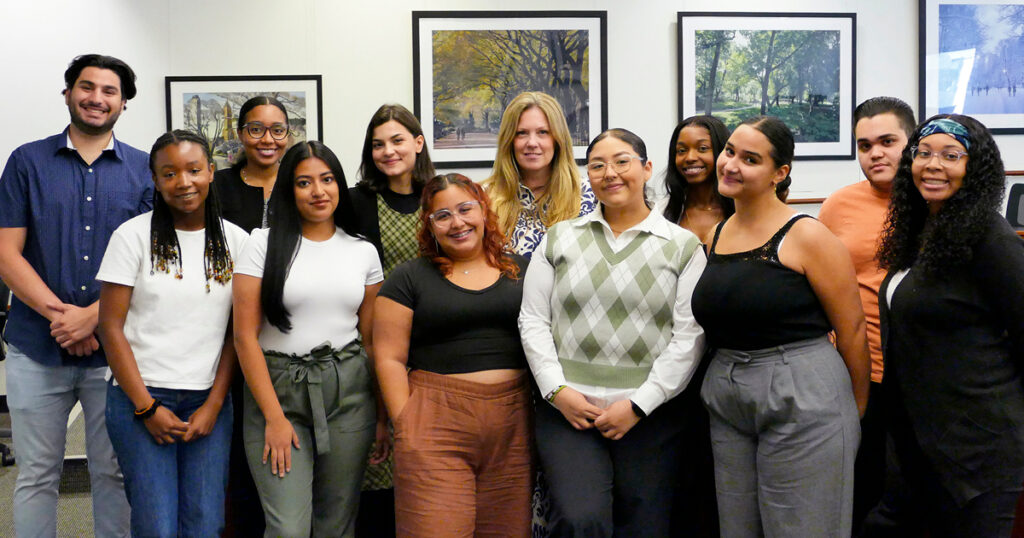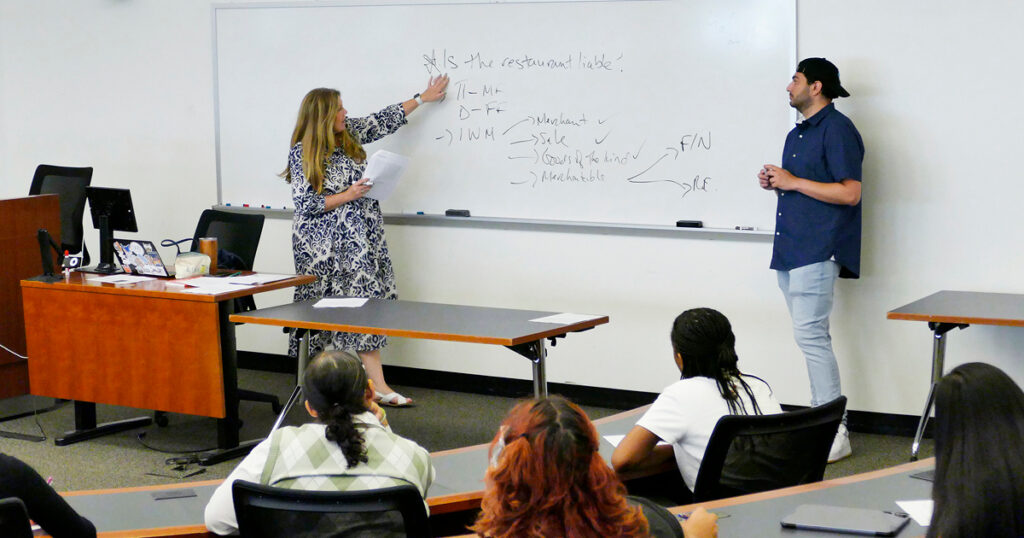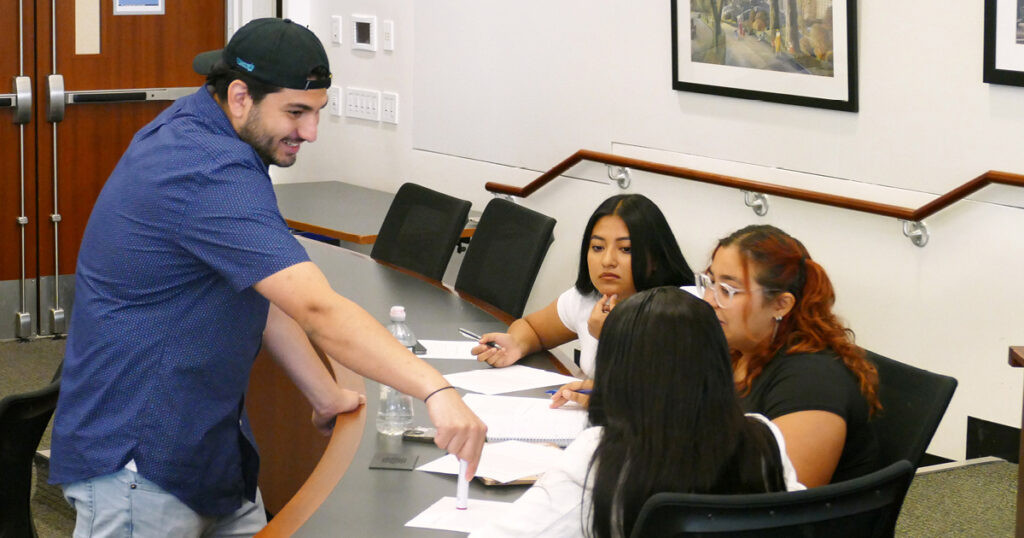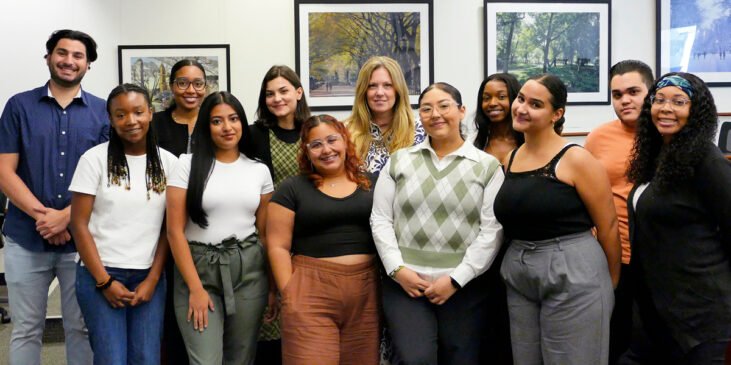
Every spring, applications open and preparations begin for NYLS’s Undergraduate Summer Pre-Law Pipeline Program. To get a sense of the program, we’re looking back at last year’s session.
The room buzzed with excited chatter as the students of Professor Amy Wallace’s Intro to Legal Analysis class gathered for their Wednesday morning session last summer. The students were enthusiastic members of the 2023 Undergraduate Summer Pre-Law Pipeline Program, and they were getting prepared for the day’s lesson.
Teaching Assistant Steven Gomez ’25, casually sat atop one of the desks, welcoming students as they filed into the classroom. Dressed in business casual and with coffees in hand, the students chatted and laughed.
One turned to Gomez, a former Pipeline participant and then-rising 2L at New York Law School.
“Did you make friends when you were in this class?” the student asked. Gomez nodded with a smile.
But camaraderie and friendship wasn’t the only takeaway for these students. The Undergraduate Summer Pre-Law Pipeline Program “introduces rising juniors to the beginnings of a journey to law school,” says Ella Mae Estrada, Associate Dean and Vice President for Enrollment Management, Student Financial Services, and Institutional Diversity, Equity, and Inclusion. “With projects involving LSAT prep, legal analysis, legal methods, legal writing, and professional development, the program provides aspiring lawyers with an opportunity to gain insight on the investment of legal education.”
Rising juniors and seniors in the Pipeline program attend four weeks of courses at NYLS for two consecutive summers—and NYLS maintains a relationship with the students throughout their final two years of college. The comprehensive program includes a broad introduction to the study of law and helps students discern their possible career choice. Special emphasis is paid toward developing law school thinking skills, like reasoning, reading comprehension, and precision of communication.
The goal of the program is to make students “feel confident that they have a place in law school,” Dean Estrada says. “The program empowers them. They can do this. Law school is for them. They just need to put the tools that they learned into practice and apply in a year or two.”
In an Intro to Legal Analysis session, the students crowded into the first few rows of a giant lecture hall, creating an intimate and friendly atmosphere. Professor Wallace led a discussion and fostered a welcoming atmosphere, and the students were eager to participate and voice their opinions. Professor Wallace fielded incorrect answers with more questions, guiding the students to find their way toward understanding.
The students were back in person after a week of remote study—by their own request.
“After the first week they reached out to me and said: ‘We really love being in person. Can we please be in person next week?’” Professor Wallace says.
Gomez fielded questions and offered advice to the students, especially drawing from his own past experience as a Pipeline student.
“I always knew that I wanted to be a lawyer, but it wasn’t until the program that I got a taste of what it’s like to study and use the law. This course opened my eyes to the possibilities that the law provides for those who need help. It was one of the best parts of my summer, it sparked another level of excitement,” he says.
The summer ended with a capstone project, led by NYLS Dean and President Anthony W. Crowell and Senior Associate Dean Matt Gewolb. The project’s theme was professional identity formation, personal authenticity, and professionalism — critical concepts and competencies for successful lawyers. Working collaboratively and using all of their new skills, students researched, prepared, and delivered presentations that explored professional identity formation in law students and lawyers.
The project stressed that it is “incumbent upon every lawyer to ensure they develop their own identities and styles that allow them to be true to who they are—and at the same time deliver excellence in advice advocacy for those individuals and communities they represent.”
Students were asked to consider issues of gender or gender identity, race, ethnicity, religion, disability, economic status, education status, immigrant status, language status, professional status or affiliation, and political diversity—all of which impact professional identity formation.
It’s well in line with the NYLS ethos, which stresses cultural competency and develops lawyers with an ability to empathize, understand, and vigorously advocate for clients from a variety of backgrounds.
Students delivered their presentations with poise and confidence—and benefited from the supportive environment of the NYLS community. Students will return this year, and a new class of rising juniors will join in just a few months. And when it comes time to apply to law schools, they’ll have an inside look at the law school experience—they won’t be working in the dark.
“I want them to walk away from the program with confidence and think: I can show up on the first day of law school and feel like I’m ready for this,” Professor Wallace says. “I want them to have a sense of belonging. I want them to feel like: There’s a place for me here. I am welcome here. My perspective is valued.”
Undergraduate Summer Pre-Law Program
Applications are now open to college students for the summer 2024 program, which will take place in person at New York Law School. The application deadline is March 30, 2024. Apply now.



